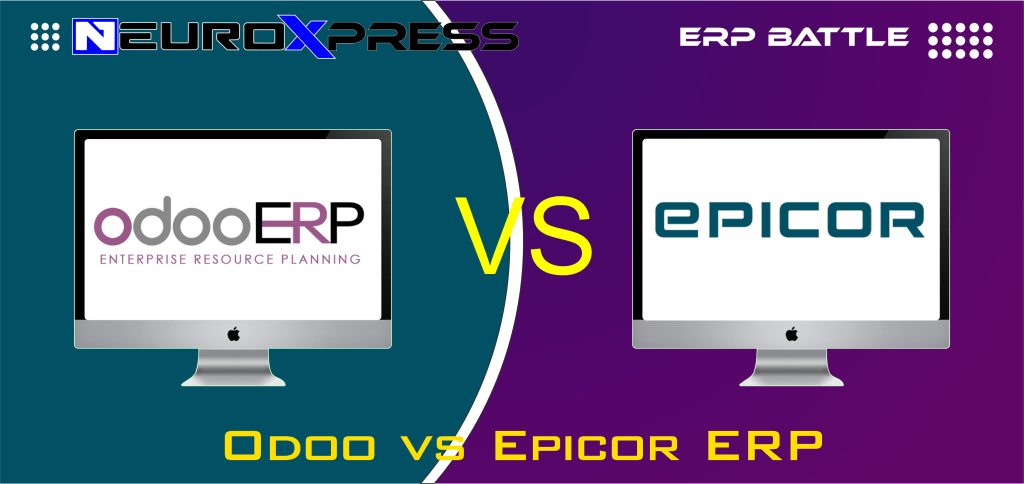ERP Software Comparison: Odoo vs Epicor ERP – Choosing the Right Solution for Your Business
Introduction
When a business begins to outgrow spreadsheets and disconnected software, it’s time to seek an ERP solution that can bring everything together. But with so many options in the market, finding the perfect fit can feel overwhelming. In this ERP Software Comparison: Odoo vs Epicor ERP, we’ll unpack two strong contenders — Odoo, the open-source giant, and Epicor ERP, the powerhouse for manufacturing and distribution sectors.
Both platforms promise efficiency, scalability, and improved decision-making. But which one is right for your business journey? Let’s dive deep into the world of Odoo and Epicor ERP.
Overview of Odoo
What is Odoo?
Odoo is a highly modular, open-source ERP solution originally designed for small to mid-sized businesses but has evolved into a global platform that serves companies of all sizes. Its strength lies in its extensive app marketplace and flexibility, allowing businesses to pick and customize modules according to their needs.
Key Features of Odoo
-
Over 30 main applications and 16,000+ third-party apps
-
Open-source flexibility with customization options
-
Integrated CRM, accounting, manufacturing, project management, and e-commerce
-
Cloud and on-premises deployment
-
Intuitive and modern user interface
Overview of Epicor ERP
What is Epicor ERP?
Epicor ERP is a robust, industry-specific ERP platform focused primarily on manufacturing, distribution, retail, and services industries. Known for its deep functionality and configurability, Epicor ERP empowers businesses to streamline operations, enhance customer experiences, and drive growth.
Key Features of Epicor ERP
-
Strong manufacturing and supply chain management capabilities
-
Cloud, on-premises, and hybrid deployment options
-
Built-in business intelligence and analytics
-
Industry-specific modules (manufacturing, distribution, services)
-
Scalable architecture supporting multi-site and global operations
ERP Software Comparison: Odoo vs Epicor ERP
Core Features and Capabilities
| Feature | Odoo | Epicor ERP |
|---|---|---|
| Deployment | Cloud & On-premises | Cloud, On-premises, Hybrid |
| Industry Focus | All industries | Manufacturing, Distribution, Retail, Services |
| Financial Management | Strong | Very Strong |
| Manufacturing Support | Good (with customization) | Excellent |
| Customization | Very High | High |
| Reporting & Analytics | Good | Advanced |
| Integration Capabilities | Extensive via apps | Native and third-party integrations |
Pros and Cons of Odoo and Epicor ERP
Pros and Cons Table
| Category | Odoo | Epicor ERP |
|---|---|---|
| Pros | ✔ Open-source flexibility ✔ Affordable for SMBs ✔ Extensive app ecosystem ✔ Highly customizable |
✔ Deep industry-specific functionality ✔ Strong manufacturing and supply chain tools ✔ Comprehensive business intelligence ✔ Scalable for global operations |
| Cons | ✖ May require technical expertise for customization ✖ Some apps lack deep functionality ✖ Potential integration issues with third-party apps |
✖ Higher cost compared to Odoo ✖ Longer implementation cycles ✖ Can be complex for smaller businesses |
Storytelling: Real-World Use Cases
Odoo in Action
Imagine GreenSprout, a growing organic products company, looking for an ERP system to support its expanding retail operations. Budget-conscious and needing flexibility, GreenSprout found Odoo perfect — affordable, customizable, and expandable with countless apps to meet their e-commerce and logistics needs.
Epicor ERP in Action
On the other hand, MetalWorks Precision, a mid-sized manufacturing firm, faced challenges in production scheduling, quality management, and supply chain complexity. They needed an ERP that could handle their intricate manufacturing workflows. Epicor ERP turned out to be the perfect match, offering deep manufacturing-specific features out of the box and scalable cloud deployment.
Detailed Comparison Factors
Deployment and Flexibility
-
Odoo: Flexible deployment on cloud or on-premises.
-
Epicor ERP: Offers cloud, on-premises, and hybrid deployment.
Industry-Specific Features
-
Epicor ERP excels in manufacturing, distribution, and services industries.
-
Odoo covers a broad range of industries but may require more customization.
Customization Options
-
Odoo: Highly customizable, open-source platform.
-
Epicor ERP: Customizable, but follows more industry-standard practices.
Reporting and Business Intelligence
-
Epicor ERP: Advanced reporting and analytics.
-
Odoo: Good reporting, with extra modules for advanced needs.
Cost Analysis
-
Odoo: Lower entry cost but may incur additional expenses for customization and apps.
-
Epicor ERP: Higher initial investment but extensive built-in functionalities.
Summary Table: Which ERP Suits Your Business?
| Business Need | Recommended ERP |
|---|---|
| Affordable and flexible for SMBs | Odoo |
| Deep industry-specific manufacturing features | Epicor ERP |
| Highly customizable platform | Odoo |
| Advanced business intelligence | Epicor ERP |
| Scalable multi-site/global operations | Epicor ERP |
Conclusion of ERP Software Comparison: Odoo vs Epicor ERP
Choosing between Odoo and Epicor ERP ultimately depends on your company’s industry, growth stage, budget, and technical needs.
-
Choose Odoo if you value flexibility, affordability, and a wide app ecosystem.
-
Choose Epicor ERP if you need industry-specific depth, manufacturing prowess, and advanced reporting capabilities.
Both ERP solutions have proven their worth — it’s about matching the right tool to your journey ahead.
👉 Dive deeper by exploring Odoo’s Official Website and Epicor ERP’s Official Website.
